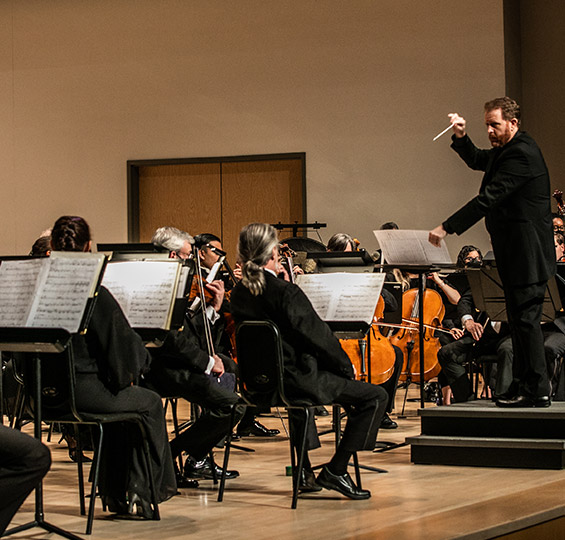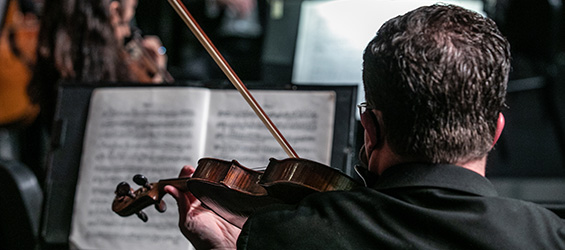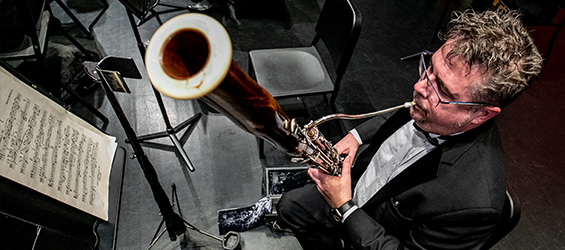Founded in 1951, the Georgia Symphony Orchestra has engaged audiences through imaginative programming, visionary leadership, and critically acclaimed performances.
Our Mission
The mission of the Georgia Symphony Orchestra is to break down access barriers to ensure that the transformative power of music serves all members of our community. The GSO enriches lives and creates impact far beyond the concert hall through innovative and engaging performances, world-class educational programs, and intentional community engagement.
Our Vision
Our vision is to be the cultural heartbeat of our community. We envision a world where every voice resonates, is celebrated and is valued through the unique power of music.
Our Values
We value high quality musical performances and we prioritize quality musicianship in our productions.
We value the accessibility of our programs to the community, we prioritize making venues, times, and cost fit the needs of the community, and we make sure no one will be left behind.
We embrace diversity and innovation in our programming to inspire the widest possible audience with our musical experiences.
We value the importance of volunteers across our organization.
We value the support of our donors and audience members and continually manage our resources effectively and efficiently.
We recognize the vital contributions of our musicians and educators and we strive to maintain relationships that create a positive environment for all.
We strive to provide a variety of high-quality musical education opportunities for youth and for life-long learning.



75 Years of Music, Community, and Marietta Pride
The Georgia Symphony Orchestra began in 1951 in the Church Street home of Arthur F. Moor, where the Marietta Music Club gathered local musicians to share their talents with the community. Under longtime conductor Betty Shipman Bennett, the group evolved into the Marietta Community Symphony, laying the groundwork for what would become a treasured cultural institution.
As the city grew, so did its orchestra. Under the leadership of Steven Byess and later Michael Alexander, the organization expanded artistically and structurally, launching the Georgia Youth Symphony Orchestra – with 350 students now the largest in the southeast, and the Georgia Symphony Chorus. Reflecting its widening reach, the organization rebranded in 2011 as the Georgia Symphony Orchestra, while staying proudly rooted in Marietta.
Today, under Music Director Timothy Verville, the GSO continues to serve as a cultural pillar of Marietta and Cobb County. Our concerts aren’t just performances—they’re community celebrations. From our beloved Holiday Pops concerts to rich partnerships with churches like Zion Baptist, First Presbyterian, First Methodist, and St. James Episcopal, the GSO is deeply woven into the life of the city.
We’re proud to be pioneers in accessibility, launching some of the first Sensory Friendly Concerts in the region, offering welcoming, judgment-free musical experiences for individuals with sensory sensitivities. Through our new Family Concert Series, we’re introducing young children and first-time audiences to the joy of live classical music—building tomorrow’s music lovers today.
The GSO Chorus continues to raise the bar, preparing to represent Marietta and the GSO on an international tour of the United Kingdom, showcasing our city’s cultural excellence on the world stage.
As we step into our 75th Diamond Anniversary Season, energy and momentum are building. Guided by our mission to remove barriers to access so that everyone can experience the transformational power of music, we remain committed to serving Cobb County and beyond. The Georgia Symphony Orchestra proudly represents Marietta—and invites all to discover the magic of our Gem City through the power of music.
GSO Music Directors
Betty Shipman Bennett
1955-1989
Steven Byess
1989-2004
Michael Alexander
2004-2015
Timothy Verville
2016-Present
© 2024 Georgia Symphony Orchestra
All Rights Reserved

